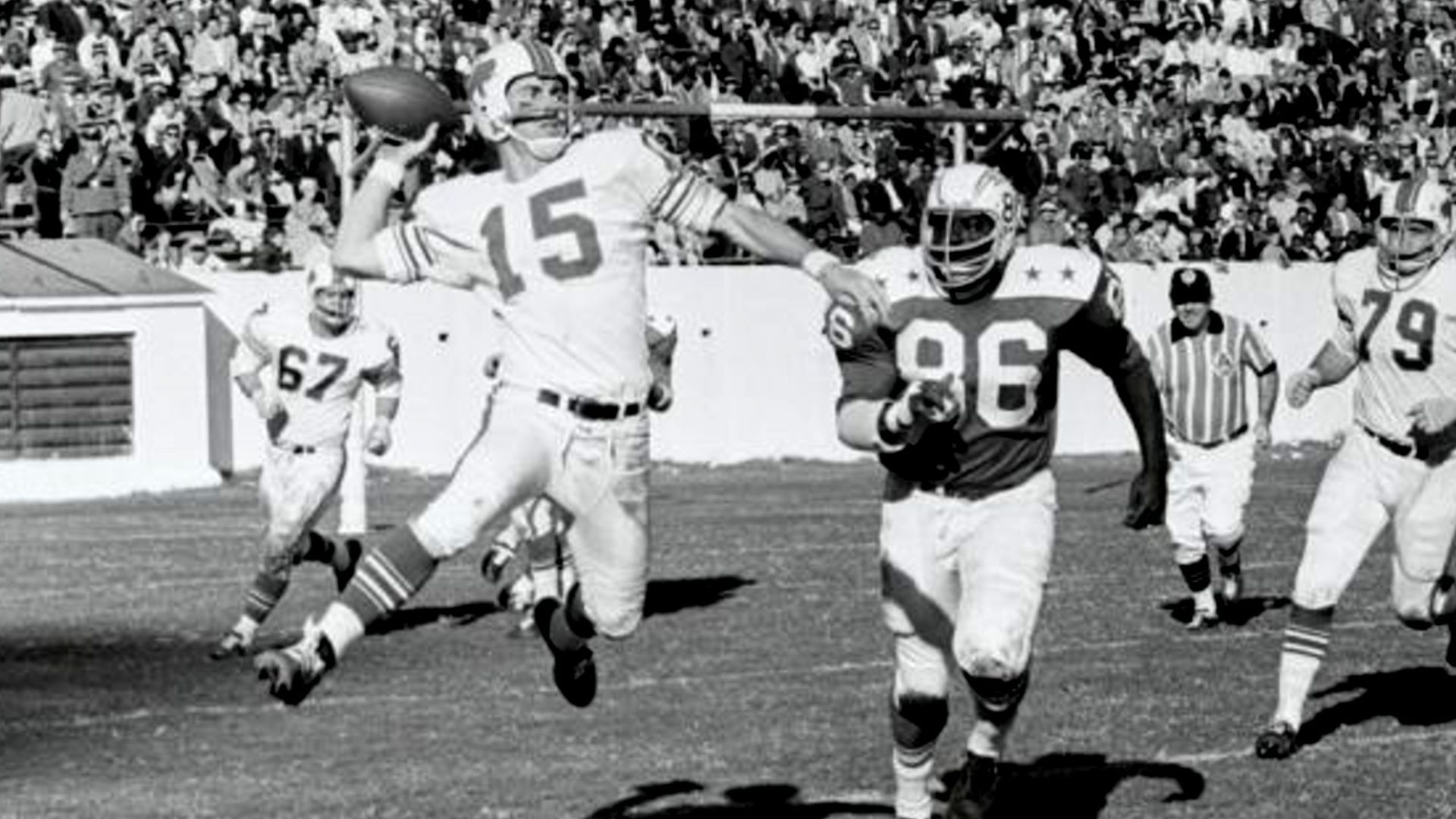Remembering pro football’s most bizarre All-Star game
Feb 5, 2023 - 4:05 PM
As the NFL concludes a four-day Pro Bowl Games event that has looked more like a “Battle of the Network Stars” than a football game, we are reminded of an unusual postseason event from decades ago: the American Football League’s “All-Star Bowl” following the 1965 season.
Like its rival — the National Football League — the AFL had been holding an annual postseason All-Star game since its formation in 1960, pitting a team of star players from its Eastern and Western divisions against each other in an exhibition game that took place after the league championship game.
But in the four previous AFL All-Star games, the Western team had outscored the Eastern team 133-79, winning every one of the games; it was hard to put together competitive squads from two four-team divisions — particularly when one of them contained the Kansas City Chiefs, Oakland Raiders and San Diego Chargers.
So after the 1965 season, the league tried a format that the NFL — then consisting of just 10 teams — had used from 1938 through 1942: the league champion would play an All-Star team taken from the rest of the league.
This meant that the two-time AFL champion Buffalo Bills would face the best players of the league’s other seven teams at Houston’s Rice Stadium on January 15, 1966.
“You’ve got a highly coordinated team like Buffalo playing against one that’s only been together a week,” said San Diego head coach Sid Gillman.
The Chargers had lost to the Bills 23-0 in the league championship on December 26, giving Gillman the honor of coaching the All-Star team.
But Bills coach Joel Collier — suddenly in charge after head coach Lou Saban had resigned to become head coach at the University of Maryland — didn’t think the All-Stars would be a pushover.
“You’ve got a team like the All-Stars with highly qualified personnel — more qualified than any All-Star team the league has ever had,” he said. “There is no place you can let up on them.”
Quarterback Jack Kemp led the Bills. (Yes... the same Jack Kemp who was a prominent Congressman from New York State in the 1970s and 1980s). His backup was third-year player Daryle Lamonica, who would become an All-Pro with Oakland Raiders in 1967. Also on the Buffalo roster was an earnest 22-year-old rookie linebacker from Pittsburgh named Marty Schottenheimer.
Unsurprisingly, the All-Star team had 15 Chargers on its roster — including quarterback John Hadl, flanker (wide receiver) Lance Alworth and man-mountain defensive tackle Ernie Ladd, who would join Kansas City in 1967. But there were also nine Chiefs on the squad: tight end Fred Arbanas, flanker Frank Jackson, left tackle Jim Tyrer, safety Johnny Robinson, defensive tackle Buck Buchanan, defensive end Jerry Mays and linebackers Sherrill Headrick, Bobby Bell and E.J. Holub. (Holub wouldn't become an offensive center until 1968).
The Bills took a 13-6 halftime lead on the strength of a 61-yard fumble return touchdown by Buffalo safety George Saimes and a pair of Pete Gogolak field goals; Patriots placekicker Gino Cappelletti kicked two for the All-Stars before intermission.
But in the second half, AFL rookie of the year Joe Namath of the New York Jets took over at quarterback, leading the All-Stars to score 24 points on four drives — including two that ended with touchdown passes to Alworth, who left the game on a stretcher after being knocked unconscious on his second score.
Trailing 30-13 in the fourth quarter, the Bills replaced Kemp with Lamonica, who led Buffalo on a 75-yard scoring drive. But it just wasn’t enough. The All-Stars won 30-19.
In 1966, the Chiefs hammered the Bills 31-7 for their second AFL championship — but they never got a chance to play the league’s All-Star team. That season, the league went back to the old East-West format — and the two divisions split the final four AFL All-Star games.
But the Chiefs ended up with a better perk: representing the AFL in the first AFL-NFL Championship game against the Green Bay Packers. In the game we now call Super Bowl I, Kansas City fell to Green Bay 35-10 — but three years later, defeated the Minnesota Vikings 23-7 in Super Bowl IV to become the world champions of professional football.
Be the first!
Related News
- Jason Kelce Calls Out Travis over Andy Reid Feb 14
- Super Bowl Sets Viewership Record Feb 13
- Joe Burrow Defends Brock Purdy From Game Manager Allegations Feb 9
- Brock Purdy's Super Bowl Appearance Elevates Him to Elite Status Jan 30
- Kansas City Chiefs Look Super Bowl Ready Jan 29
- Lamar Jackson and Ravens Come Up Short Jan 29
- Chiefs Beat Ravens, Heading to Second-Straight Super Bowl Jan 28
- Buffalo Bills Fall Short Again Jan 22
- Patrick Mahomes and Lamar Jackson Set for Epic AFC Championship Showdown Jan 22
- Travis Kelce Announces He Will Continue His NFL Career Next Season Jan 12
- Taylor Swift Has Competition for NFL Social Media MVP Dec 26
- Arrowheadlines: The Chiefs are broken Dec 26